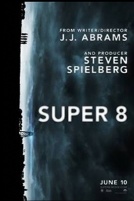 Now, before diving into what exactly is wrong with J.J. Abrams Super 8, let me make one thing clear: I don’t hate it and am glad that it took the #1 spot at the US box office last week. Even if I don’t think it works, I’m glad that an ‘original’ sci-fi movie out of Hollywood can claim the top spot without having to be filled with instantly recognizable actors and a story adapted from a familiar comic book character or a set of kids’ toys.
Now, before diving into what exactly is wrong with J.J. Abrams Super 8, let me make one thing clear: I don’t hate it and am glad that it took the #1 spot at the US box office last week. Even if I don’t think it works, I’m glad that an ‘original’ sci-fi movie out of Hollywood can claim the top spot without having to be filled with instantly recognizable actors and a story adapted from a familiar comic book character or a set of kids’ toys.
I also don’t side with the camp that complains that all Abrams did was pander to nostalgia, that the only reason anyone likes Super 8 is because it’s a reverse engineered Spielberg movie from the heyday of Amblin Entertainment. I don’t think that’s the case at all, and for one simple reason: if Abrams had reverse engineered ET, it would be a better movie. The problem with Super 8 is that it has a half-baked script that doesn’t understand the dynamics that made those movies great.
The biggest comparison point between Super 8 and the Amblin movies – a comparison I’ve heard Abrams make himself – is that it’s about a kid with a broken home life who deals with those issues through surviving some kind of event. He’s directly referenced The Goonies, ET and Stand By Me and how influential those stories were to him when it came to writing the script, and that’s clear from the final product, but what Super 8 fails to do is create any sense of unity among its characters. It’s as though Abrams went “Well, stick a handful of kids together and then they become a group. Right?” Super 8 doesn’t understand the dynamics of friendship.
Just because you show a group of kids together doesn’t mean that we believe all these kids are closer to one another than they are their parents. That’s the crux of an Amblin movie. It has nothing to do with “the event” or the broken family and everything to do with the idea that when you’re a kid you get to choose your friends, you spend so much time with them that they become a type of emotional armor you’re safe behind as long as you’re together. Those movies work so well because you fully understand the relationship between all of these kids. You can imagine what life is like before the movie starts and what it will be like after the movie ends.
The child actors are all fine. The adults are great, too. The problem doesn’t lay with the performances, it lays solely with Abrams. There’s a sense of unity and cohesion that just isn’t in Super 8. Sure, Abrams can have a nice crane shot of kids riding on bicycles, but it doesn’t have the same sense of purpose, that same rebellious freedom you got when the ET gang took to the streets. It’s just an image, not a feeling. The connective tissue that makes up the film’s heart just isn’t there. So instead of an awesome story about kids banding together, we get a forced, artificial story that crosses superficial must-haves off of a blueprint. Worse yet, it doesn’t realize that’s the case.
Sure, there are more problems with the movie. The CGI isn’t blended well with the time period, the relationship between the father is insincere and exists solely to supply conflict, the kids don’t spend nearly enough time together. But what really holds Super 8 back is the fact that Abrams has taken a Field of Dreams mentality to his script. He thinks that if you supply the materials and build it, the emotions will just come. But that’s not how screenwriting works. There is a difference between building something and crafting it. You can’t just identify and assemble components; you need to actually craft a story for it to have any emotional stakes to it. And there’s no craft to Super 8, just manufacturing.


